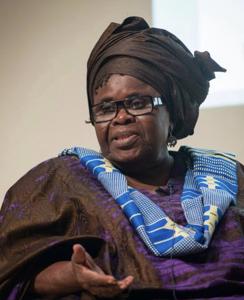Ama Ata Aidoo (1942–2023): A Towering Voice for African Women and Literature
- Rev. Dr. Ango Fomuso Ekellem

- Aug 6, 2025
- 3 min read
Ama Ata Aidoo was more than a writer—she was a visionary force, a literary architect of African identity, and one of the most powerful feminist voices of her generation. Born Christina Ama Ata Aidoo in the town of Abeadzi Kyiakor, Ghana, she was raised in a Fante royal household that deeply valued education. Her father established the first school in their village, a move that would shape Ama’s life and destiny as an intellectual and advocate for learning.
Aidoo’s literary journey began in the halls of the University of Ghana, Legon, where she wrote her first play, The Dilemma of a Ghost (1965). With its publication, she made history as the first published African female dramatist. That single act broke open doors and shattered ceilings, paving the way for generations of African women to find their voices in literature, academia, and beyond.
Her works—whether poetic, theatrical, or fictional—have always been daring, nuanced, and unafraid to challenge convention. Novels like Our Sister Killjoy (1977) and Changes: A Love Story (1991), which won the Commonwealth Writers’ Prize, explored the tension between modernity and tradition, gender and power, love and autonomy. Aidoo did not simply tell stories—she deconstructed colonial and patriarchal paradigms with wit, grace, and unrelenting honesty. Her characters—especially women—refused to be victims. They were thinkers, rebels, dreamers, and doers.
While the global literary world was just beginning to grasp the importance of African female narratives, Aidoo was already there, centering African women as complex protagonists in their own right. She portrayed African womanhood not as a symbol of suffering, but as a seat of strength, resilience, intellect, and agency. She taught us that the African woman is not just a subject of struggle, but an embodiment of survival, identity, and transformation.

But Aidoo was not content to stay within the realm of words. In 1982, she was appointed Ghana’s Secretary for Education, becoming one of the few women to hold such a position. Her tenure, though brief, was marked by a bold advocacy for free and equitable education—values she had embodied her entire life. She later resigned when her vision clashed with governmental constraints, but the message was clear: Ama Ata Aidoo was never one to compromise her truth.
Aidoo was also a professor, mentor, and founder. She taught at numerous universities across Africa and the U.S., and in 2000, she established the Mbaasem Foundation—a space dedicated to empowering African women writers through mentorship, residencies, and support. Through this initiative, she extended her influence far beyond the page, ensuring that other women could take up the pen and claim their place in the global literary canon.
Throughout her life, Aidoo remained fiercely committed to African feminism, not as an imported ideology, but as a lived experience deeply rooted in the continent’s history, politics, and cultural complexity. Her feminism was not loud for the sake of noise—it was intelligent, intersectional, and unapologetically African. She challenged both Western misconceptions and internalized silences, proving that an African woman could be deeply traditional and radically revolutionary all at once.
She passed away on May 31, 2023, at the age of 81, and was honored with a state funeral—a fitting tribute for a woman who shaped not just Ghanaian literature, but African letters and thought at large. Yet even in death, Ama Ata Aidoo’s voice echoes. In every African girl who dares to write, in every student who reads Anowa, and in every reader who sees themselves clearly for the first time in her words—her legacy lives on.
💬 "The African woman has always been a source of power, not a symbol of weakness."—Ama Ata Aidoo
She wrote. She taught. She led. She broke barriers.Ama Ata Aidoo did not merely exist—she transformed every space she entered.











Comments